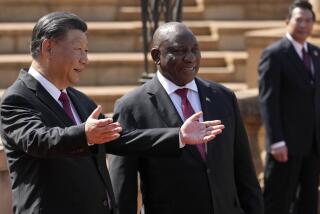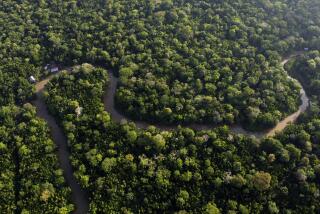International Business : Caribbean Leaders Gather for Summit on Establishing Free-Trade Bloc : Commerce: Transportation, tourism will also be discussed. Invitation to Cuba keeps U.S. territories from attending.
- Share via
PORT OF SPAIN, Trinidad — The heads of 30 Caribbean countries and dependent territories gathered Wednesday for the largest regional summit on trade since the Miami meeting of hemispheric leaders in December.
The two-day summit beginning today will officially launch the Assn. of Caribbean States, composed of the 13 independent states of the Caribbean Community (Caricom), plus Cuba, Haiti, the Dominican Republic, Mexico, Colombia, Venezuela and the countries of Central America.
Although Cuba has refused to confirm Fidel Castro’s participation, officials here expected his arrival. The Cuban delegation, more than 110 strong, was by far the largest and most of its members were listed as “security” personnel.
The summit is viewed as a critical forum for Cuba’s effort to integrate into the international community. Since it lost preferred trade and aid ties with the former Soviet Bloc in 1990, the Communist-ruled island has forged or normalized diplomatic links with almost all Caribbean-region nations.
Security was tight at the hotel where the heads of state will confer today and Friday. Heavily armed state police and military patrolled the hallways and grounds.
*
Officials said the leaders of most of the 25 member nations were expected, along with leaders from the British possessions of Anguilla and Turks and Caicos Islands, the Dutch states of Aruba and the Netherlands Antilles, and the French department of Guadeloupe.
The summit will focus on trade, transportation and tourism. The primary objective behind the ACS is the creation of a free-trade bloc among the members. Colombia, Venezuela and Mexico are already working toward a common market, and Caricom is committed to a single market by 1997.
Officials concede it will be difficult to harmonize the different rules of origin and tariff levels among the existing blocs and to integrate those countries and territories not part of any sub-grouping.
The new group has an annual total trade volume of about $180 billion, but analysts believe trade between member states accounts for less than 10% of the total.
Caricom Assistant Secretary General Byron Blake blamed the low trade volume on the “lack of direct and frequent access between the mainland countries and the insular states.” The region’s exporters say it is easier to get goods shipped from Florida than between Caribbean countries.
Officials will seek to boost tourism, which generates $11 billion a year for ACS members. But tourist traffic between member nations is negligible, and the region believes its heavy dependence on North American visitors cannot continue.
The ACS marks the first time both Haiti and Cuba have been invited to join a regional trade bloc. Cuba in particular is anxious to strengthen ties with the region. Trade between Cuba and the Caribbean states was just $150 million last year.
Cuba was expected to cement institutional links and transport routes. But most critical, the summit promised to provide Cuba a forum to gain support for its campaign against the 34-year-old U.S. economic embargo.
*
The invitation to Cuba led to a U.S. decision not to allow Puerto Rico and the U.S. Virgin Islands to participate.
The treaty establishing the ACS was signed in Cartagena, Colombia, last year. With a combined gross domestic product of $500 billion, the ACS is the fourth-largest trade bloc in the world.
Trinidad officials said they are well prepared to host the summit despite labor woes and a political dispute that led to declaration of a limited state of emergency two weeks ago.
More to Read
Sign up for Essential California
The most important California stories and recommendations in your inbox every morning.
You may occasionally receive promotional content from the Los Angeles Times.













